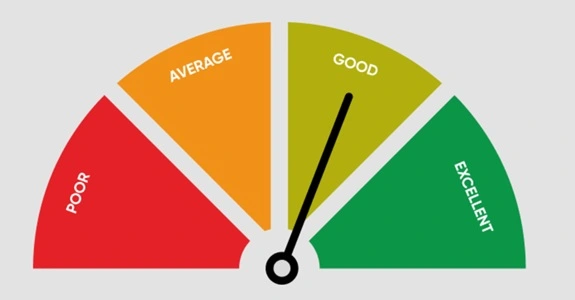Maintaining a healthy credit score is now becoming more and more essential for securing loans, credit cards, and even for various job applications. In India, the most widely used credit score is the CIBIL score, which is generated by the Credit Information Bureau (India) Limited. Your CIBIL score, a three-digit number ranging from 300 to 900, determines your financial credibility and eligibility for various credit facilities. A good CIBIL score can open doors to better loan terms, lower interest rates, and a higher chance of approval.
At Bajaj Markets, we understand how vital it is to monitor your credit health, and we’re here to guide you on how to check and maintain a good CIBIL score range. Let’s dive into the different ways you can verify and keep an eye on your CIBIL score to ensure it stays in the optimal range.
Why Does Your CIBIL Score Matter?

Your CIBIL score is crucial because it reflects your creditworthiness, helping lenders assess your ability to repay loans. The higher your score, the more likely you are to be approved for loans and credit cards with favorable terms. Here’s why your CIBIL score matters:
- Loan Eligibility: A good CIBIL score increases your chances of loan approval.
- Interest Rates: A good score helps you secure loans at lower interest rates, saving you money in the long run. For example, if your CIBIL score is within the range of 800 to 900, you could be eligible for loans with interest rates as low as 9.99% on the Bajaj Markets new loan app.
- Credit Card Approvals: Lenders are more likely to approve credit card applications from individuals with a strong score.
- Rental and Job Applications: Some landlords and employers may review your CIBIL score as part of their decision-making process.
To be in the best possible position financially, you need to be aware of your CIBIL score and take steps to maintain or improve it. The good news is that monitoring your score is now easier than ever.
1. Check Your CIBIL Score Regularly
The first step to understanding and managing your credit health is checking your CIBIL score. With the Bajaj Markets new loan app, you can check your credit score for free. Here’s how you can do it:
- Download the Bajaj Markets app
- The Credit Score icon will be visible at the bottom centre.
- Fill in your mobile number and get it verified with an OTP.
- Request your free CIBIL score and gain instant access to your score and detailed credit report.
- Review the report for any discrepancies or outdated information.
Regularly checking your CIBIL score helps you stay informed about your financial standing and enables you to spot potential issues before they affect your creditworthiness.
2. Monitor Your CIBIL Score for Changes
Once you know your CIBIL score, it’s important to monitor it regularly. Many credit bureaus, including CIBIL, offer monitoring services that can alert you about any significant changes to your credit score. This is especially important if you have ongoing loans or credit card payments.
By staying on top of your score, you can quickly respond to any dips or drops and take corrective actions. For instance, you might notice a sudden decrease in your score due to a missed payment or a high credit utilization ratio. The earlier you spot these issues, the quicker you can act to improve your score.
3. Check for Errors and Discrepancies
A common reason for a lower CIBIL score is errors in your credit report. It’s essential to thoroughly review your credit report for any mistakes, such as incorrect personal details or outdated account information. If you find discrepancies, raise a dispute with CIBIL to get the issue resolved.
Disputes may arise when:
- Your old address is listed instead of your current one.
- There are incorrect payment records.
- Accounts that have been closed or settled still show as open.
If these issues are not corrected, they could negatively affect your CIBIL score and, consequently, your ability to secure loans or credit cards.
4. Avoid High Credit Utilization
One of the best ways to maintain a healthy CIBIL score is to keep your credit utilization ratio below 30%. This means you should not use more than 30% of your available credit. High credit utilization can signal to lenders that you’re relying too heavily on credit, which could be a red flag.
To improve your credit utilization, try spreading your expenses across multiple credit cards or request a higher credit limit from your bank. This will lower your overall utilization and help keep your credit score in a good range.
5. Maintain a Healthy Credit Mix
Another factor that impacts your CIBIL score is your credit mix. Lenders prefer borrowers who have a mix of both secured and unsecured loans, as this reduces their risk. A combination of personal loans, home loans, or auto loans, along with credit cards, shows that you can handle different types of credit responsibly.
If you rely too heavily on unsecured loans like credit cards or personal loans, it may negatively affect your score. A healthy credit mix, however, can demonstrate that you are financially responsible and help improve your CIBIL score over time.
6. Avoid Multiple Credit Inquiries
Every time you apply for a new loan or credit card, the lender conducts a hard inquiry into your credit report. Too many such inquiries in a short period can harm your CIBIL score. It’s essential to apply for credit only when absolutely necessary.
If you’re in need of a loan or credit card, consider whether it’s the right time to apply, and explore alternatives to minimize the impact on your score.
7. Pay Your Bills on Time
Late payments are one of the biggest factors affecting your CIBIL score. Ensure that all your bills, including credit card payments and loan EMIs, are paid on time. Setting up auto-pay or payment reminders can help you avoid missed or delayed payments.
By keeping up with your payments, you demonstrate financial responsibility, which plays a key role in boosting your CIBIL score.
8. Increase Your Credit Limit
If you’ve been using a significant portion of your available credit, requesting an increase in your credit limit can help improve your credit utilization ratio. With a higher limit, you can keep your spending in check without maxing out your credit cards.
9. Keep Track of Co-signed Loans
If you’ve co-signed a loan for someone else, you must monitor their payments. If they miss a payment, it can impact your CIBIL score. By keeping track of co-signed loans, you can avoid unexpected hits to your score.
Financial Health Credit Report: Pinpoint What’s Affecting Your CIBIL Score:
The Financial Health Credit Report on the Bajaj Markets App helps you understand the key factors impacting your CIBIL score:
- Repayment History: Tracks missed or delayed payments affecting your score.
- Card Limit Utilization: Shows if your credit usage is too high, which can hurt your score.
- Length of Credit History: Reveals how the age of your credit accounts impacts your score.
- Credit Mix: Highlights whether your balance of secured and unsecured loans is healthy.
- Number of Credit Enquiries: Monitors excessive credit applications that may lower your score.
By analyzing these factors, the report offers insights and tips to improve your credit health.
Personal Finance Manager on Bajaj Markets App:
The Personal Finance Manager tool on the Bajaj Markets App is a powerful feature designed to help you stay on top of your finances and maintain a good CIBIL score. By linking your bank accounts to the app, you can easily track your monthly expenses, income, and investments in real time. This feature provides a comprehensive overview of your financial health, allowing you to make informed decisions and avoid overspending. By managing your finances effectively, ensuring timely bill payments, and keeping your credit utilization ratio in check, you can significantly improve and maintain a healthy CIBIL score. The tool simplifies budgeting, helps you set financial goals, and keeps you on track to secure better loan offers and credit card approvals in the future.
Conclusion
The Bajaj Markets App offers easy access to your credit score, with features like the Financial Health Credit Report, which provides insights into factors like repayment history, credit utilization, credit mix, and credit inquiries, key elements that impact your score. By regularly checking your score, monitoring for discrepancies, and keeping your credit utilization below 30%, you can improve your financial health. The Personal Finance Manager tool helps you track expenses, income, and contribution in investments in real-time, promoting smarter financial management. Regular, timely bill payments, avoiding multiple credit inquiries, and maintaining a healthy credit mix will further ensure that your score stays in the optimal range of 750 and above, giving you access to loans at lower interest rates and better financial offers.



















